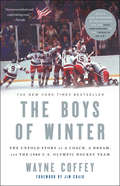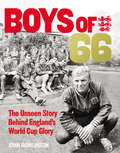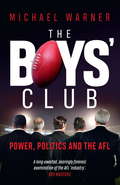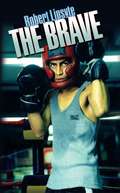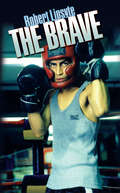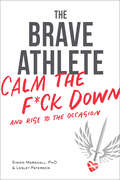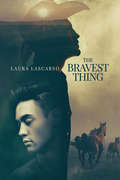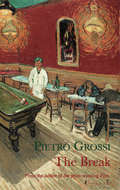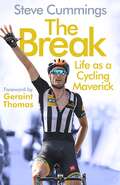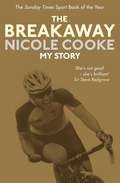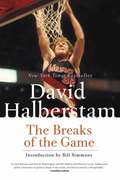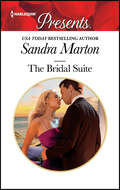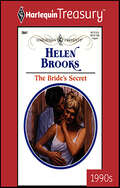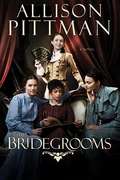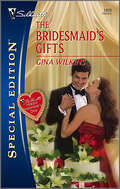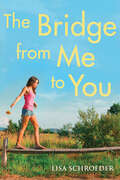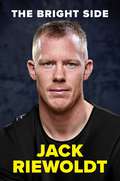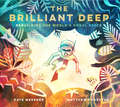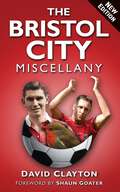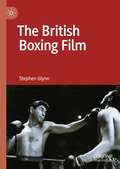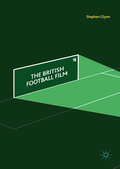- Table View
- List View
The Boys of Winter: The Untold Story of a Coach, a Dream, and the 1980 U. S. Olympic Hockey Team
by Wayne CoffeyThey were the 1980 U. S. Olympic hockey team, a blue-collar bunch led by an unconventional coach, and they engineered what Sports Illustrated called the greatest sports moment of the twentieth century. Their "Miracle on Ice" has become a national fairy tale, but the real Cinderella story is even more remarkable. Wayne Coffey casts a fresh eye on this seminal sports event, giving readers an ice-level view of the amateurs who took on a Russian hockey juggernaut at the height of the Cold War. He details the unusual chemistry of the Americans-formulated by their fiercely determined coach, Herb Brooks- and seamlessly weaves portraits of the boys with the fluid action of the game itself. Coffey also traces the paths of the players and coaches since their stunning victory, examining how the Olympic events affected their lives. Told with warmth and an uncanny eye for detail, The Boys of Winter is an intimate, perceptive portrayal of one Friday night in Lake Placid and the enduring power of the extraordinary.
The Boys of ’66 - The Unseen Story Behind England’s World Cup Glory
by John RowlinsonWembley, 30 July 1966… Geoff Hurst completes his hat trick… England are the World Cup champions.Everyone knows how the story ends, but how did it begin? How did Alf Ramsey assemble an England team to win the trophy for the first, and so far only time? The choice of the final eleven was far from straightforward: in just over three years Ramsey selected no less than fifty players and, at the start of 1966, two of the winning team had still to make their debuts for England.This book charts the chequered path to eventual victory, assesses both the players who made the final squad and those who lost out and, with the help of previously unpublished photographs, provides a unique chronicle of professional football over fifty years ago.
The Boys' Club
by Michael WarnerThe Boys' Club is the must-read inside story behind the power and politics of AFL, Australia's biggest sport.Revealing how the fledgling state administrative body evolved into the Australian Football League and its meteoric rise to become one of the richest and most powerful organisations in the land, award-winning investigative journalist Mick Warner delivers a fascinating insight into key figures and their networks.Tracking the rise of the game and the AFL figureheads, The Boys' Club lifts the lid on the scandals, secrets and deal making that have shaped the Australian game.
The Brave
by Robert LipsyteThe long-awaited sequel to The Contender. 17-year-old Sonny Bear has lived most of his life on the reservation with Uncle Jake. Sonny's fists have found him escape, but when he takes off for New York City, his fighting instincts land him in trouble with the law. Then he meets Alfred Brooks--hero of The Contender and now a cop--who helps Sonny discover the strength that's within him.
The Brave
by Robert LipsyteSonny's been an outsider all his life. He has never fit into either world: the Moscondagas on the Reservation see him as white; whites see him as Indian. So far, Sonny's managed to harness his anger -- what he calls "the monster" -- in the boxing ring. But Sonny wants out of the Res. He's headed for New York City, where nobody can tell him what to do.Sonny doesn't count on stepping into the middle of a drug war when he gets there -- or on tangling with a tough Harlem boxer-turned-cop named Alfred Brooks. Brooks seems to think that Sonny's got the talent to make it to the top -- to be a contender. But first Sonny's got to learn to be smart, take control of his life, and beat the monster. Only it isn't as easy as it sounds....
The Brave Athlete: Calm the F*ck Down and Rise to the Occasion
by Simon Marshall Lesley PatersonDefeat the thirteen most common mental conundrums athletes face in training and competition, so you can feel confident, suffer like a hero, and handle any stress.The Brave Athlete from Dr. Simon Marshall and Lesley Paterson will help you take control of your thoughts and feelings so you can train harder, race faster, and better enjoy your sport. Dr. Marshall is a sport psychology expert who trains the brains of elite professional athletes. Paterson is a three-time world champion triathlete and coach. Together, they offer this innovative, brain training guide that is the first to draw from both clinical science and real-world experience with athletes. That means you won’t find outdated “positive self-talk” or visualization gimmicks here. No, the set of cutting-edge mental skills revealed in The Brave Athlete actually work because they challenge the source of the thoughts and feelings you don’t want. The Brave Athlete is packed with practical, evidence-based solutions to the most common mental challenges athletes face. Which of these sound like you? Why do I have thoughts and feelings I don’t want? I wish I felt more like an athlete. I don’t think I can. I don’t achieve my goals. Other athletes seem tougher, happier, and more badass than me. I feel fat. I don’t cope well with injury. People are worried about how much I exercise. I don’t like leaving my comfort zone. When the going gets tough, the tough leave me behind. I need to harden the f*ck up. I keep screwing up. I don’t handle pressure well. With The Brave Athlete, you can solve these problems to become mentally strong and make your brain your most powerful asset.
The Bravest Thing
by Laura LascarsoHigh school junior Berlin Webber is about to reap the fruits of his hard work and land a football scholarship—if he can keep his sexuality a secret from his best friend, Trent, and their homophobic coach. Then Hiroku Hayashi swerves into the high school parking lot on his tricked-out motorcycle like some sexy comic book villain, and Berlin knows he doesn’t stand a chance. Hiroku is fleeing his sophisticated urban scene to recover from drug addiction and an abusive relationship when he arrives in Berlin’s small Texas ranch town. Initially sarcastic and aloof, Hiroku finds in Berlin a steady, supportive friend who soon becomes more. As Hiroku and Berlin’s romance blossoms, they take greater risks to be together. But when a horrific act of violence tears them apart, they both must look bigotry in the face. While Berlin has always turned to his faith for strength, Hiroku dives into increasingly dangerous ways of coping, pushing them in opposite directions just when they need each other most. Two very different young men search for the bravery to be true to themselves, the courage to heal, and the strength to go on when things seem darkest. But is it enough to bring them back together?
The Break
by Howard Curtis Pietro GrossiDino is a placid, unambitious man. Living in a small provincial town, he and his wife spend their time planning journeys to faraway places - journeys they never take. Dino's only passion is billiards, and he spends his evenings in the local billiards hall honing his technique. One day, however, Dino's quiet life is interrupted - his wife falls pregnant. This the first in a series of events that shake him from his slumber and force Dino to test himself for the first time. As in his widely praised Fists, Pietro Grossi's stripped-down prose brings out the epic human drama in a tale of everyday life.
The Break: Life as a Cycling Maverick
by Steve Cummings"Getting in a break was my one chance of winning. The hard part was working out, again and again, how to make that chance count." Steve Cummings sharp, resourceful and a permanent outsider; for nearly 20 years Steve Cummings determinedly blazed his own winning trail in international cycling. A maverick who defied the dominant teams, to record a sequence of gloriously improbable victories, he has lived and raced with legends of the sport - Cavendish, Wiggins, Froome, Thomas and others - about whom he has strong views and untold stories. This autobiography of one of Britain's most successful international riders of the modern era takes the reader from Steve's earliest days as a junior, pounding across the flatlands of the Wirral, through his love-hate relationships with the British Cycling track cycling squad, to his series of top-level breakaway victories in the Tour de France, Tour of Britain and Vuelta a EspaÑa and - rather than standout physical talent - how developing his own strategies and training techniques enabled him to succeed against the odds. The Break will be the first full-length account of the life and times of, in the words of ProCycling magazine, a "universally popular and respected rider in the cycling world."
The Breakaway
by Nicole CookeA retirement statement from a sports star rarely causes a flicker, but Nicole Cooke went out as she rode her bike: giving it her all. The contrast could not have been greater - as Lance Armstrong, a fraudster backed by many corporate sponsors and feted by presidents, was about to deliver a stage-managed confession to Oprah, so a young woman from a small village in Wales took aim. She too had been a cyclist, the only rider ever to have become World and Olympic champion in the same year, and the first British cyclist to have been ranked World No.1, but as a woman in a man's sport, her exploits gained little recognition and brought no riches. She too had ridden through this dark period for the sport when drug-taking was everywhere. Nicole Cooke spoke up for those who had taken a very different path to Lance and his team-mates. In her frank and outspoken autobiography, Cooke reveals the real story behind British cycling's rise to global dominance. With a child's dreams of success, she left home at 18 to pursue her goals in Italy. Broken contracts, unpaid wages, a horrendous injury and drugs cheats were just some of the challenges she faced, even before she lined up to take on her opponents. The Breakaway is a book that will not only inspire all those who read it, but which also asks some serious questions about the way society regards women's sport.
The Breakaway
by Nicole CookeA retirement statement from a sports star rarely causes a flicker, but Nicole Cooke went out as she rode her bike: giving it her all. The contrast could not have been greater - as Lance Armstrong, a fraudster backed by many corporate sponsors and feted by presidents, was about to deliver a stage-managed confession to Oprah, so a young woman from a small village in Wales took aim. She too had been a cyclist, the only rider ever to have become World and Olympic champion in the same year, and the first British cyclist to have been ranked World No.1, but as a woman in a man's sport, her exploits gained little recognition and brought no riches. She too had ridden through this dark period for the sport when drug-taking was everywhere. Nicole Cooke spoke up for those who had taken a very different path to Lance and his team-mates. In her frank and outspoken autobiography, Cooke reveals the real story behind British cycling's rise to global dominance. With a child's dreams of success, she left home at 18 to pursue her goals in Italy. Broken contracts, unpaid wages, a horrendous injury and drugs cheats were just some of the challenges she faced, even before she lined up to take on her opponents. The Breakawayis a book that will not only inspire all those who read it, but which also asks some serious questions about the way society regards women's sport.
The Breakaway
by Nicole CookeA retirement statement from a sports star rarely causes a flicker, but Nicole Cooke went out as she rode her bike: giving it her all. The contrast could not have been greater - as Lance Armstrong, a fraudster backed by many corporate sponsors and feted by presidents, was about to deliver a stage-managed confession to Oprah, so a young woman from a small village in Wales took aim. She too had been a cyclist, the only rider ever to have become World and Olympic champion in the same year, and the first British cyclist to have been ranked World No.1, but as a woman in a man's sport, her exploits gained little recognition and brought no riches. She too had ridden through this dark period for the sport when drug-taking was everywhere. Nicole Cooke spoke up for those who had taken a very different path to Lance and his team-mates. In her frank and outspoken autobiography, Cooke reveals the real story behind British cycling's rise to global dominance. With a child's dreams of success, she left home at 18 to pursue her goals in Italy. Broken contracts, unpaid wages, a horrendous injury and drugs cheats were just some of the challenges she faced, even before she lined up to take on her opponents. The Breakawayis a book that will not only inspire all those who read it, but which also asks some serious questions about the way society regards women's sport.
The Breaks of the Game
by David HalberstamMore than 6 years after his death David Halberstam remains one of this country's most respected journalists and revered authorities on American life and history in the years since WWII. A Pulitzer Prize-winner for his ground-breaking reporting on the Vietnam War, Halberstam wrote more than 20 books, almost all of them bestsellers. His work has stood the test of time and has become the standard by which all journalists measure themselves.The New York Times bestseller, now with a new introduction! The Breaks of the Game focuses on one grim season (1979-80) in the life of the Bill Walton-led Portland Trail Blazers, a team that only three years before had been NBA champions.The tactile authenticity of Halberstam's knowledge of the basketball world is unrivaled. Yet he is writing here about far more than just basketball. This is a story about a place in our society where power, money, and talent collide and sometimes corrupt, a place where both national obsessions and naked greed are exposed. It's about the influence of big media, the fans and the hype they subsist on, the clash of ethics, the terrible physical demands of modern sports (from drugs to body size), the unreal salaries, the conflicts of race and class, and the consequences of sport converted into mass entertainment and athletes transformed into superstars--all presented in a way that puts the reader in the room and on the court, and The Breaks of the Game in a league of its own.
The Bridal Suite (Do Not Disturb Ser. #1979)
by Sandra MartonRead this classic romance by bestselling author Sandra Marton!DO NOT DISTURB. Anything can happen behind closed doors!The newspapers call her new boss a financial genius; the gossip columns brand him gorgeous. But Dana knows Griffin McKenna takes whatever he wants, be it a company or a woman. She can think of other words to describe him: arrogant, egotistical, self-important…When Dana and Griffin arrive at an important conference to find they have to share a room, Dana is ready to run! A whole weekend with Griffin in the Bridal Suite? But then she experiences for herself the McKenna take-over technique…to genius and gorgeous, add great lover!Originally published in 1998
The Bride's Secret
by Helen BrooksShould she confess to her husband?Marianne had been thrilled when Hudson de Sance proposed. But could she really go ahead with the wedding? She was being blackmailed, and the only solution seemed to be disappearing from Hudson's life....Only, Hudson had found her, and he was still determined to make Marianne his wife. But now he was driven by revenge, not love! Marianne longed to marry him-but what would happen when Hudson discovered his bride's secret?
The Bridegrooms: A Novel
by Allison PittmanNow, Vada is a grown woman, still making her home with her father and sisters. Her days are spent serving as an errand girl for Cleveland’s fledgling amateur orchestra; her evenings with Garrison Walker, her devoted, if passionless, beau. Dizzying change occurs the day the Brooklyn Bridegrooms come to town to play the Cleveland Spiders and a line drive wallops the head of a spectator. The fan is whisked to the Allenhouse parlor, and questions swirl about the anonymous, unconscious man. Suddenly, the subdued house is filled with visitors, from a flirtatious, would-be sports writer to the Bridegrooms’ handsome star hitter to the guilt-ridden ballplayer who should have caught the stray shot. The medical case brings Dr. Allenhouse a frustration and helplessness he hasn’t felt since his wife’s disappearance. Vada’s sisters are giddy at the bevy of possible suitors. And Vada’s life is awakened amid the super-charged atmosphere of romantic opportunity.
The Bridesmaid's Gifts
by Gina Wilkins“CAN YOU TELL WHAT I’M THINKING?”—ETHAN BRANNON, SKEPTICHandsome but cynical Ethan was hardly a believer in Aislinn Flaherty’s special “gifts.” And despite her attraction to him, the full-time cake maker/part-time psychic vowed to ignore Ethan. Really. Until she started having “feelings” about his long-lost brother. Deep down, she knew she could reunite Ethan with the relative he was sure was gone forever.If only her feelings for Ethan were just as reliable...z
The Bridge from Me to You
by Lisa SchroederLauren has a secret. Colby has a problem. But when they find each other, everything falls into place. From the author of the Charmed Life series.In alternating chapters of verse and prose, new girl Lauren and football hero Colby come together, fall apart, and build something stronger than either of them thought possible—something to truly believe in.“Writing in alternating viewpoints, with Lauren’s chapters unfolding in free verse and Colby’s in prose, Schroeder (Falling for You) offers a thoughtful, straightforward, and fairly chaste romance between two kind, generous teens—one burdened by her past, one burdened by his future.” —Publishers Weekly“The alternating chapters of Lauren’s poetry and Colby’s conversational prose are well written and help reveal the characters refreshingly unique perspectives, as well as their growth in positive ways . . . This light, fast-paced story will delight romance fans looking for a fun, hopeful read.” —School Library Journal“Familiar characters and a quiet plot are elevated by poetry that is as beautiful as it is varied. Lovely in its details.” —Kirkus Reviews
The Bright Side: An AFL champion's story of redemption, fortitude, and positivity
by Jack RiewoldtIn his gritty and inspirational memoir, Jack Riewoldt reveals all about his remarkable AFL career and his personal journey of growth off the field. Jack grew up in picturesque Tasmania, playing sport with his family and admiring his older cousin Nick. When Nick was drafted in the AFL, Jack&’s focus shifted to footy, and that competitive drive helped Jack become one of Richmond&’s most beloved and prolific players.The Bright Side dives into every important win, including Richmond&’s recent premierships, as well as the losses that helped Jack learn and build resilience. Jack&’s positive attitude has helped him overcome a brush with cancer, the loss of his much-loved cousin Maddie – sister of Nick Riewoldt, with whom Jack remains a spokesman for the charity in her name – and the misunderstanding that has dogged much of his career. In The Bright Side, Jack finally corrects some of the misperceptions. From mischievous youngster to revered leader of the game, it&’s family and community that has pulled Jack through, and allowed him to become an AFL legend.The book includes a foreword by Gerard Whateley.
The Brilliant Deep: Rebuilding the World's Coral Reefs
by Kate Messner Matthew ForsytheThe Brilliant Deep is the proud recipient of the ALA Notable Children's Books Award, the NSTA-CBC Best STEM Trade Books Award, the Junior Library Guild Selection and the ILA Teacher's Choices. All it takes is one: one coral gamete to start a colony in the ocean, one person to make a difference in the world, one idea to help us heal the earth. The ongoing conservation efforts to save and rebuild the world's coral reefs—with hammer and glue, and grafts of newly grown coral—are the living legacy of environmental scientist Ken Nedimyer, founder of the Coral Restoration Foundation.In telling the story of this sea conservation pioneer and marine life protector, Kate Messner and Matthew Forsythe create a stunning tribute to the wonders of nature and the power of human hope—a power even the smallest readers can access in their quest to aid our extraordinary planet. Recommended by experts for children who are reading independently and transitioning to longer books, The Brilliant Deep is perfect for the following reading categories:Books for Kids Ages 5-9Children's Books for Kindergarten – 3rd GradeNonfiction Science Studies EducationSummer Reading
The Brilliant Deep: Rebuilding the World's Coral Reefs
by Kate Messner Matthew ForsytheThe Brilliant Deep is the proud recipient of the ALA Notable Children's Books Award, the NSTA-CBC Best STEM Trade Books Award, the Junior Library Guild Selection and the ILA Teacher's Choices. All it takes is one: one coral gamete to start a colony in the ocean, one person to make a difference in the world, one idea to help us heal the earth. The ongoing conservation efforts to save and rebuild the world's coral reefs—with hammer and glue, and grafts of newly grown coral—are the living legacy of environmental scientist Ken Nedimyer, founder of the Coral Restoration Foundation.In telling the story of this sea conservation pioneer and marine life protector, Kate Messner and Matthew Forsythe create a stunning tribute to the wonders of nature and the power of human hope—a power even the smallest readers can access in their quest to aid our extraordinary planet. Recommended by experts for children who are reading independently and transitioning to longer books, The Brilliant Deep is perfect for the following reading categories:Books for Kids Ages 5-9Children's Books for Kindergarten – 3rd GradeNonfiction Science Studies EducationSummer Reading
The Brilliant Deep: Rebuilding the World's Coral Reefs
by Kate Messner Matthew ForsytheThe Brilliant Deep is the proud recipient of the ALA Notable Children's Books Award, the NSTA-CBC Best STEM Trade Books Award, the Junior Library Guild Selection and the ILA Teacher's Choices. All it takes is one: one coral gamete to start a colony in the ocean, one person to make a difference in the world, one idea to help us heal the earth. The ongoing conservation efforts to save and rebuild the world's coral reefs—with hammer and glue, and grafts of newly grown coral—are the living legacy of environmental scientist Ken Nedimyer, founder of the Coral Restoration Foundation.In telling the story of this sea conservation pioneer and marine life protector, Kate Messner and Matthew Forsythe create a stunning tribute to the wonders of nature and the power of human hope—a power even the smallest readers can access in their quest to aid our extraordinary planet. Recommended by experts for children who are reading independently and transitioning to longer books, The Brilliant Deep is perfect for the following reading categories:Books for Kids Ages 5-9Children's Books for Kindergarten – 3rd GradeNonfiction Science Studies EducationSummer Reading
The Bristol City Miscellany
by David Clayton Shaun GoaterThe Bristol City Miscellany - a book on the Robins like no other, packed with facts, stats, trivia, stories and legend. Now, with the club experiencing previously uncharted highs, look back at what has made this club what it is today - the players and characters that have represented City over the years and the events that have shaped the club. If you want to know the record crowd for a home game, the record appearance holder or longest-serving manager, look no further - this is the book you've been waiting for. From record goal scorers to record defeats; from Ashton Gate to Kevin Mabbutt, and from Wembley appearances to Gary Johnson - it's all in The Bristol City Miscellany - can you afford not to own a copy?
The British Boxing Film
by Stephen GlynnThis book constitutes the first full volume dedicated to an academic analysis of the sport of boxing as depicted in British film. Through close textual analysis, production and reception histories and readings that establish social, cultural and political contexts, the book explores the ways in which prizefighters, amateur boxers, managers and supporters (from Regency gentry to East End gangsters) are represented on the British screen. Exploring a complex and controversial sport, it addresses not only the pain-versus-reward dilemma that boxing necessarily engenders, but also the frequently censorious attitude of those in authority, with boxing’s social development facilitating a wider study around issues of class, gender and race, latterly contesting the whole notion of ‘Britishness’. Varying in scope from Northern circuit comedies to London-based ‘ladsploitation’ films, from auteur entries by Alfred Hitchcock to programme fillers by E.J. Fancey, the boxing film also serves as a prism through which one can trace major historical shifts in the British film industry.
The British Football Film
by Stephen GlynnThis book constitutes the first full volume dedicated to an academic analysis of British football as depicted on film. From early single-camera silents to its current multi-screen mediations, the repeated treatment of football in British cinema points to the game’s importance not only in the everyday rhythms of national life but also, and especially, its immutable place in the British imaginary landscape. Through close textual analysis together with production and reception histories, this book explores the ways in which professional footballers, amateur players and supporters (the devoted and the demonized) have been represented on the British screen. As well as addressing the joys and sorrows the game necessarily engenders, British football is shown to function as an accessible structure to explore wider issues such as class, race, gender and even the whole notion of ‘Britishness’.
